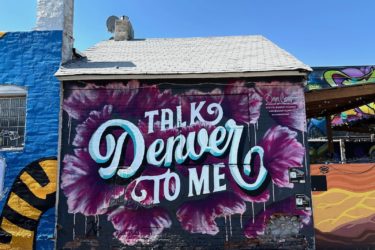The Local newsletter is your free, daily guide to life in Colorado. For locals, by locals.
In 1996, Jody Bouffard started working at a Denver lesbian nightclub called the Elle to save money for pharmacy school. But while mopping floors and cleaning bathrooms, Bouffard—whose parents kicked her out at 16 after she revealed she was gay—found family. “When Ellen DeGeneres came out, we had a watch party. The bar was way over capacity,” Bouffard says. “It was awesome to have hundreds of women in the room.” Inspired, Bouffard worked to eventually open her own lesbian-focused establishments. Today, however, Blush & Blu isn’t just her last venture standing; it’s the last remaining lesbian bar in Colorado and one of just 21 left in the United States.
Bars that cater to lesbians face several hurdles. Those who once sought community in person now find it online. It’s also safer for gay people to patronize any run-of-the-mill saloon than it used to be. Plus, “gentrification has wiped out a lot of spaces for marginalized people,” says Erica Rose, a filmmaker and co-founder of the national Lesbian Bar Project, which works to save lesbian-centric taverns.
Historically spread along Colfax Avenue, Mile High City lesbian bars have followed the trend. The Elle changed its name to 716 to try to attract a wider clientele, but it closed in 1998. Ms. C’s, a country-western joint, shuttered in 2009 after more than a decade. Denver Detour, a karaoke bar, went under around then, too.
Three of Bouffard’s four businesses—such as Her Bar, a Colfax dive that hosted karaoke and poker nights—didn’t last, either. Blush & Blu, which opened in 2012, persists thanks to a savvy balancing act. At night, it’s a dance club and bar. During the day, it’s a coffeeshop welcoming sober people and remote workers—and customers of any orientation waiting in line at VooDoo Doughnut next door. Its special events, however, such as potlucks on Thanksgiving and Christmas Day frequented by those who are estranged from their families, keep it a distinctly queer space. Bouffard also hosts weddings, funerals, and fundraisers for those in need of gender-affirmation surgery, a reflection of how the queer community is becoming more inclusive of transgender people. “It’s as much a community space as anything else,” says Marilyn Williams, a professor at the University of Denver and Blush & Blu regular.
All that was threatened when the pandemic arrived last year. Not only did Blush & Blu struggle to stay open because of COVID-19 stay-at-home orders, but it also had to cancel its holiday events because of capacity limits. Nearly 100 women show up to the gatherings each year. “They had no other place to go,” Bouffard says.
Blush & Blu has been able to keep its doors open thanks to financial support from the Lesbian Bar Project, which has raised $260,000 since its inception in 2020. The nonprofit disburses those funds directly to tavern owners, who can use the money wherever they need it the most. Bouffard used it to pay her rent.
But while it continues to endanger the business’ future, the pandemic also reaffirmed Blush & Blu’s importance to Denver’s queer community. “When things eased off a little bit, people craved being around others,” Williams says. “It sustains you, in a way. That’s why lesbian bars are important. They are sacred spaces.”
Editor’s Note 12/1/21: Following the publication of this story in 5280’s December issue, three former Blush & Blu employees filed a lawsuit against the establishment, accusing owner Jody Bouffard of wage theft and discrimination against one of the bar’s only Black employees. Bouffard disputes these claims. In an email statement to 5280, Bouffard wrote: “I can say with complete confidence that the allegations in that complaint are categorically false. I have never mistreated, or discriminated against, anyone. Blush & Blu has always been and will continue to be a welcoming space for the lgbtq+ community. All are welcome. I will defend myself against these baseless allegations in a court of law.”









